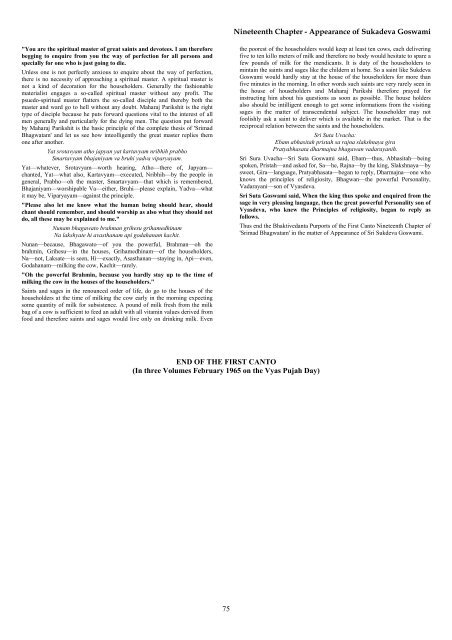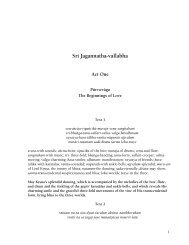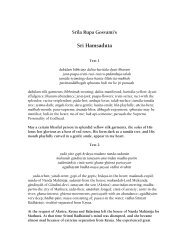Srimad Bhagavatam, Volume 3
Srimad Bhagavatam, Volume 3
Srimad Bhagavatam, Volume 3
You also want an ePaper? Increase the reach of your titles
YUMPU automatically turns print PDFs into web optimized ePapers that Google loves.
"You are the spiritual master of great saints and devotees. I am therefore<br />
begging to enquire from you thc way of perfection for all persons and<br />
specially for one who is just going to die.<br />
Unless one is not perfectly anxious to enquire about the way of perfection,<br />
there is no necessity of approaching a spiritual master. A spiritual master is<br />
not a kind of decoration for the householders. Generally the fashionable<br />
materialist engages a so-called spiritual master without any profit. The<br />
psuedo-spiritual master flatters the so-called disciple and thereby both the<br />
master and ward go to hell without any doubt. Maharaj Parikshit is the right<br />
type of disciple because he puts forward questions vital to the interest of all<br />
men generally and particularly for the dying men. The question put forward<br />
by Maharaj Parikshit is the basic principle of the complete thesis of '<strong>Srimad</strong><br />
Bhagwatam' and let us see how inteolligently the great master replies them<br />
one after another.<br />
Yat srotavyam atho japyan yat kartavyam nribhih prabho<br />
Smartavyam bhajaniyam va bruhi yadva viparyayam.<br />
Yat—whatever, Srotavyam—worth hearing, Atho—there of, Japyam—<br />
chanted, Yat—what also, Kartavyam—executed, Nribhih—by the people in<br />
general, Prabho—oh the master, Smartavyam—that which is remembered,<br />
Bhajaniyam—worshipable Va—either, Bruhi—please explain, Yadva—what<br />
it may be, Viparyayam—against the principle.<br />
"Please also let me know what the human being should hear, should<br />
chant should remember, and should worship as also what they should not<br />
do, all these may be explained to me."<br />
Nunam bhagawato brahman grihesu grihamedhinam<br />
Na lakshyate hi avasthanam api godahanam kachit.<br />
Nunan—because, Bhagawato—of you the powerful, Brahman—oh the<br />
brahmin, Grihesu—in the houses, Grihamedhinam—of the householders,<br />
Na—not, Laksate—is seen, Hi—exactly, Asasthanan—staying in, Api—even,<br />
Godahanam—milking the cow, Kachit—rarely.<br />
"Oh the powerful Brahmin, because you hardly stay up to the time of<br />
milking the cow in the houses of the householders."<br />
Saints and sages in the renounced order of life, do go to the houses of the<br />
householders at the time of milking the cow early in the morning expecting<br />
some quantity of milk for subsistence. A pound of milk fresh from the milk<br />
bag of a cow is sufficient to feed an adult with all vitamin values derived from<br />
food and therefore saints and sages would live only on drinking milk. Even<br />
END OF THE FIRST CANTO<br />
(In three <strong>Volume</strong>s February 1965 on the Vyas Pujah Day)<br />
75<br />
Nineteenth Chapter - Appearance of Sukadeva Goswami<br />
the poorest of the householders would keep at least ten cows, each delivering<br />
five to ten killo meters of milk and therefore no body would hesitate to spare a<br />
few pounds of milk for the mendicants. It is duty of the householders to<br />
mintain the saints and sages like the childern at home. So a saint like Sukdeva<br />
Goswami would hardly stay at the house of the householders for more than<br />
five minutes in the morning. In other words such saints are very rarely seen in<br />
the house of householders and Maharaj Parikshi therefore prayed for<br />
instructing him about his questions as soon as possible. The house holders<br />
also should be intilligent enough to get some informations from the visiting<br />
sages in the matter of transcendental subject. The householder may not<br />
foolishly ask a saint to deliver which is available in the market. That is the<br />
reciprocal relation between the saints and the householders.<br />
Sri Suta Uvacha:<br />
Ebam abhasitah pristah sa rajna slakshnaya gira<br />
Pratyabhasata dharmajna bhagawan vadarayanih.<br />
Sri Sura Uvacha—Sri Suta Goswami said, Ebam—thus, Abhasitah—being<br />
spoken, Pristah—and asked for, Sa—he, Rajna—by the king, Slakshnaya—by<br />
sweet, Gira—language, Pratyabhasata—began to reply, Dharmajna—one who<br />
knows the principles of religiosity, Bhagwan—the powerful Personality,<br />
Vadarayani—son of Vyasdeva.<br />
Sri Suta Goswami said, When the king thus spoke and enquired from the<br />
sage in very pleasing language, then the great powerful Personality son of<br />
Vyasdeva, who knew the Principles of religiosity, began to reply as<br />
follows.<br />
Thus end the Bhaktivedanta Purports of the First Canto Nineteenth Chapter of<br />
'<strong>Srimad</strong> Bhagwatam' in the matter of Appearance of Sri Sukdeva Goswami.












